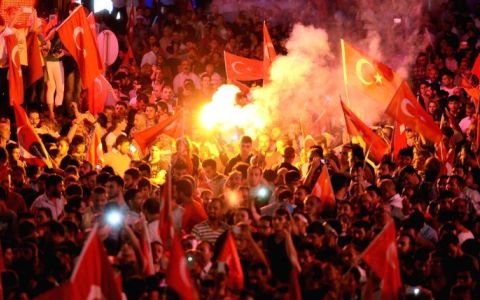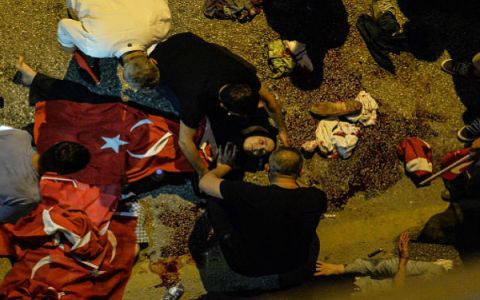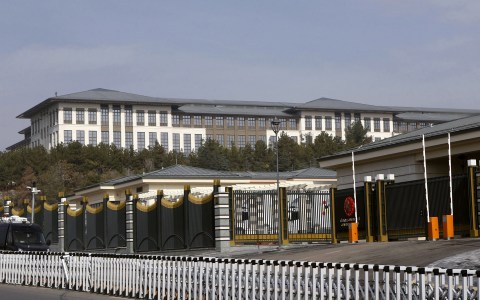ANALYSIS: The Dilemma of the Turkish State
by - 21st July 2016

AFTER the confusing coup attempt in Turkey the situation of that country remains fluid and unpredictable.
Recep Tayyip Erdoğan, the Turkish president and, although unaffiliated with it by constitutional requirement, the unquestioned leader of the ‘Islamic’ Justice and Development Party (AKP), has apparently reinforced his power in the aftermath of the confrontation.
According to the BBC, a massive purge of public officials suspected of opposition to Erdoğan or sympathy with the coup is underway.
Some 50,000 government employees, including 35,000 military, police, and judicial officers, plus academics and media figures, have been fired, interned, or arrested.
On 20 July, the Turkish government prohibited all academics from travelling outside the country.
The Financial Times reports that Erdoğan’s supporters are demanding the reinstatement of the death penalty, which Turkey abolished in 2004 in a measure necessary for entry into the European Union – which status Turkey has been denied.
Execution would thus, presumably, await anybody the authorities serving Erdoğan deem to have been insufficiently loyal.
Turkey is the most coup-prone country in NATO, and has always been rife with conspiratorialism.
These cultural issues are visible in the single-minded, vindictive manner in which Erdoğan has targeted Fethullah Gülen, a Muslim cleric and spiritual Sufi advocate for interfaith dialogue, who lives in the United States.
Gülen and his followers in the Hizmet or ‘Service’ movement are former allies of Erdoğan.

The Erdoğan government has accused the Gülen movement of ‘terrorism’, blaming it for the coup plot, and demanding extradition of the cleric from the US to Turkey.
Gülen has denied any involvement by himself or his acolytes in the insurrectionary attempt, labelling it a provocation intended to strengthen authoritarianism under Erdoğan.
All signs point to Erdoğan using the ill-organized coup as a pretext for annihilation of the Gülen movement.
As described in The New York Times, Gülen disciples are believed widely to have ‘infiltrated’ the Turkish state, with special attention to the judiciary, police and military.
This endeavor was encouraged by Gülen in his speeches.
The US government has so far corroborated no evidence of terrorism or other criminal or subversive activities by the Gülen network.
The Gülen movement is credited with operation of hundreds of schools offering education from primary to university levels around the world.
The Washington Post notes that the schools emphasize training in science, technology, engineering, and mathematics and do not feature Islamic instruction.
In addition, however, the ‘alleged’ Gülen schools – which often disclaim a connection to the movement – frequently require instruction in Turkish as a second language, which has been viewed as intrusive and bizarre in many Western countries.
Aside from the charges by Erdoğan against Gülen, observers of the Turkish situation discern many causes for discontent in the country’s military apparatus.
The Turkish Army considers itself the guardian of secularism as established in the 1920s.
Turkish secularism is seen by numerous observers as threatened by the religious fervor of Erdoğan and AKP.
Along with military and other secular forces, large minorities within Turkish society are disaffected from AKP governance.
These include Turkish Alevis, a Shia-Sufi community accounting for about a quarter of the 75-80 million Turkish subjects, and, above all, the Kurds, who comprise 25-35 million, many of them Alevis.
Turkish secularism has been accompanied by establishment of Sunni Islam as the national form of Muslim devotion, and the Alevis have suffered discrimination for their heterodox practices, which include music and dancing during prayer.
Such minorities defend Turkish secularism.
But even some ultra-nationalist Turks feel slighted by AKP.
All the Turkish political parties, including the secular People’s Republican Party or CHP and the pro-Kurdish People’s Democratic Party or HDP, opposed the failed military takeover.
Erdoğan has sought clearly to transform the Turkish presidency, which was previously a figurehead position, into a more powerful ‘executive’ office.
To attain this goal, he introduced legislation lifting the immunity of members of parliament.
The law was passed in May 2016 by a vote of 376 deputies out of 550 seats in the Grand National Assembly.
Representatives of the CHP and HDP made up most of 138 deputies vulnerable to criminal prosecution for purported ‘terrorism’.

Erdoğan has also spent public monies lavishly, ordering construction of a £500 million ‘White Palace’ as his residence. According to Forbes magazine the 62-year-old topped the list of the highest paid political figure with his earnings put at £43.2m.
The ‘White Palace’ was bombed by rebel air force jets during last week’s attempted coup, but damage to it has not yet been disclosed.
Other challenges facing Erdoğan include the civil war in Syria, on Turkey’s southern border.
There, too, the Kurdish question arises.
Forces based in the Kurdistan Regional Government (KRG) of Iraq, as well as radical leftist fighters from Turkey affiliated with the Kurdistan Workers’ Party (PKK) and, in Syria, the PKK-allied People’s Protection Units (YPG), have mounted a significant campaign against the forces of the so-called ‘Islamic State’ (ISIS).
While the EU and US classify the PKK as ‘terrorist’, the US has supported the YPG against ISIS, through integration of the Kurdish troops with the American-backed Syrian Democratic Forces (SDF).
Erdoğan and the remnants of the Turkish secular state must contend with a multifaceted internal and external polarization, amid a general global crisis.
The country’s political and constitutional breakdown was therefore inevitable.
